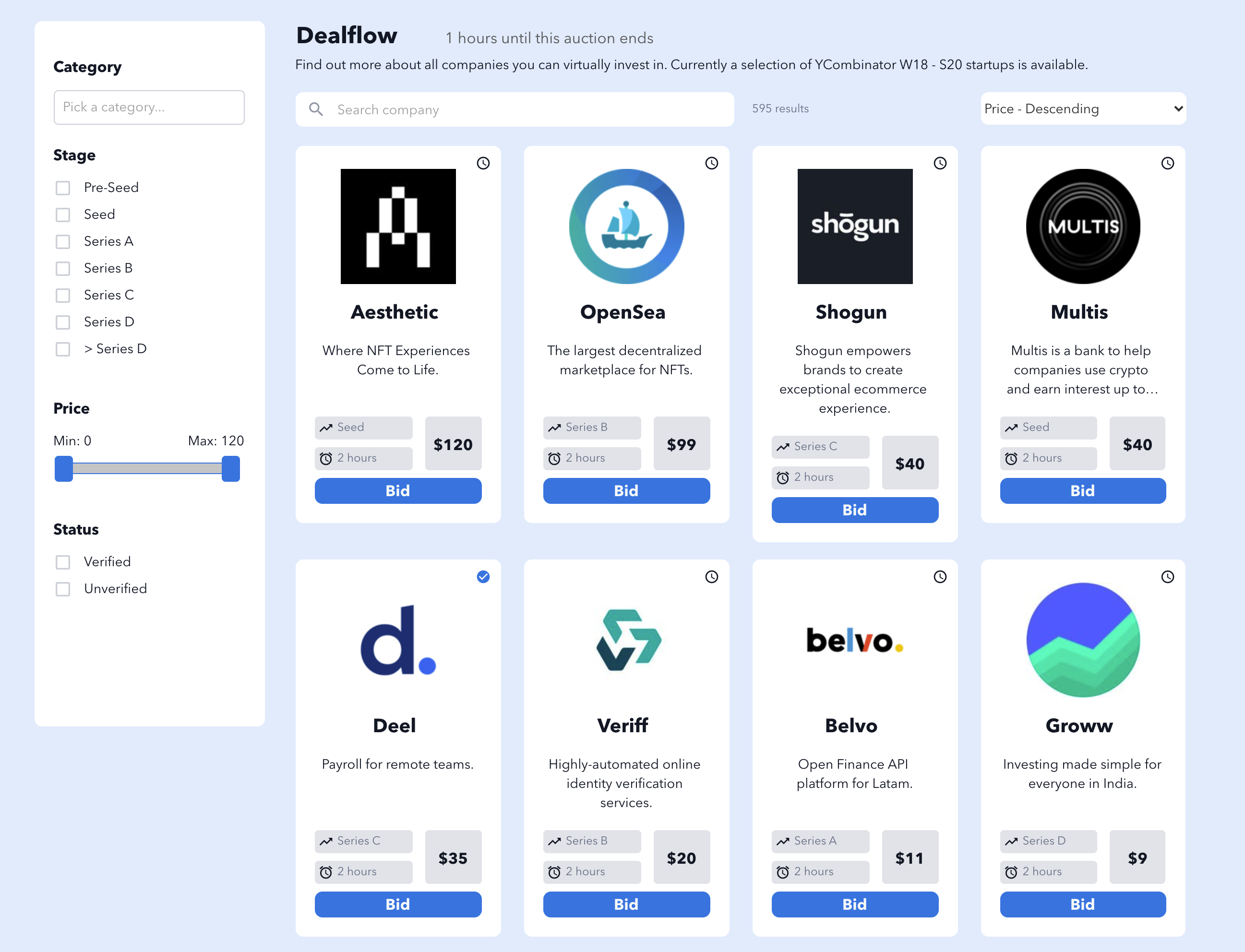The meme-ification of ownership and the wild acceleration of private startup valuations have led us to this moment where a former VC firm associate has built a crypto marketplace designed for “fantasy startup investing,” where users spend real money buying fakes shares — in NFT form, of course — of real startups.
The game, which launches out of closed beta today, is called Visionrare and founders Jacob Claerhout and Boris Gordts see a way to take the gamification of investing to its furthest end, mimicking the appeal of fantasy sports leagues and giving users a way to compete with friends by betting on startups they think will be successful. Users can bid on NFT shares of hundreds of different startups at auction and compete to build the best performing fake portfolio.
At launch, Visionrare’s database of companies is confined to a smattering of Y Combinator startups from some of the more recent classes. Before you ask, no, they mostly do not have the permission of the startups they’re selling fake shares in to use their names and logos, but the founders hope that the game-like nature of the platform will discourage those companies from sending out the cease & desist letters. Startups can verify their profiles and receive a healthy percentage of their NFT shares to distribute as they see fit, or they can contact Visionrare to take their startup’s profile down, or they can, of course, just ignore it.
The game aims to simplify the complexity of venture capital in an auction format that’s tied to the actual fundraising cycles of the startups and their real world performance. Visionrare auctions off 100 serialized “VisionShares” per funding round, one at a time for each startup, with bids starting at $5. Once a user accumulates a certain number of shares (at least five) they can join a league and compete with other users through a fantasy-like experience, moving up and down a leaderboard while competing for a share of the collective value of the VisionShares based on the performance of their own portfolio.

Visionrare’s marketplace
As the platform crosses into open beta, there are still some substantial to-do list items for the company, namely building out its secondary market and support to sell VisionShares on outside platforms like OpenSea. Users currently purchase VisionShares with credit cards, but the team is also looking to roll out crypto payments soon.
The game’s subject matter lacks a few correlations with something like Monday Night Football that may prove difficult to scale a fantasy league with, namely the lack of publicly available performance information. If these were public companies, the game could be organized around something concrete like share price or consistent metrics from their quarterly earnings, but startups are much more careful in the information they release publicly.
Visionrare gets startup performance data from Tracxn which they use to analyze their own valuation-like “Visionrare score” for the companies each week. This score is the fundamental basis for tracking progress and winners in the leagues, but in a market where intangibles can often push valuations, treating the market with this kind of cross-industry consistency overindexed on data like press mentions, social media followers and app downloads will clearly lead to some substantial disconnect at times between private valuations and the scores. Claerhout, who previously worked in early stage investing at Paris-based investment firm Partech, notes that “this is not an exact science,” but hopes they can get access to more data streams over time that improve the performance of their scoring algorithm.
A bigger challenge may be ensuring that the most deep-pocketed users aren’t consistently winning league competitions — just like they do in the real world. League winners are determined by which portfolios pick up the most Visionrare score points over a given playing period, but given the long timelines of venture success stories, there may be some misaligments when it comes to making long-term bets on an early team versus hitching your wagon to a trending SaaS startup. The founders say they are still playing with some of the league mechanics and note they will make adjustments as Visionrare scales to keep things fun and fair.
Ultimately, it’s an early project made by a couple of young entrepreneurs with zero funding that captures some of the ridiculousness of both the crypto space and today’s startup investment ecosystem, nevertheless Visionrare’s founders hope their fake NFT shares market offers an opportunity for people interested in startups to showcase their conviction for picking winners, something that they hope could one day serve as a signal for VCs looking for their next hires.
“It’s a really hard industry to build credentials in and there are a lot of people who have neither the access nor the capital,” Claerhout tells TechCrunch. “If you believe in a company, buy a VisionShare.”
Source Link ‘Fantasy equity’ NFT game wants you to spend real money buying fake shares of real startups
Leave a Reply